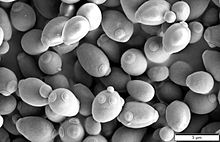
Back Saccharomyces cerevisiae AF Saccharomyces cerevisiae AN خميرة الجعة Arabic فطريات الخميره ARZ Saccharomyces cerevisiae BE Saccharomyces cerevisiae Bulgarian Llevat de cervesa Catalan Saccharomyces cerevisiae CEB Saccharomyces cerevisiae Czech Saccharomyces cerevisiae Danish
| Saccharomyces cerevisiae | |
|---|---|

| |
| S. cerevisiae, electron micrograph | |
| Scientific classification | |
| Domain: | Eukaryota |
| Kingdom: | Fungi |
| Division: | Ascomycota |
| Class: | Saccharomycetes |
| Order: | Saccharomycetales |
| Family: | Saccharomycetaceae |
| Genus: | Saccharomyces |
| Species: | S. cerevisiae
|
| Binomial name | |
| Saccharomyces cerevisiae Meyen ex E.C. Hansen
| |
Saccharomyces cerevisiae (/ˌsɛrəˈvɪsi.iː/) (brewer's yeast or baker's yeast) is a species of yeast (single-celled fungal microorganisms). The species has been instrumental in winemaking, baking, and brewing since ancient times. It is believed to have been originally isolated from the skin of grapes.[a] It is one of the most intensively studied eukaryotic model organisms in molecular and cell biology, much like Escherichia coli as the model bacterium. It is the microorganism which causes many common types of fermentation. S. cerevisiae cells are round to ovoid, 5–10 μm in diameter. It reproduces by budding.[1]
Many proteins important in human biology were first discovered by studying their homologs in yeast; these proteins include cell cycle proteins, signaling proteins, and protein-processing enzymes. S. cerevisiae is currently the only yeast cell known to have Berkeley bodies present, which are involved in particular secretory pathways. Antibodies against S. cerevisiae are found in 60–70% of patients with Crohn's disease and 10–15% of patients with ulcerative colitis, and may be useful as part of a panel of serological markers in differentiating between inflammatory bowel diseases (e.g. between ulcerative colitis and Crohn's disease), their localization and severity.[2]
Cite error: There are <ref group=lower-alpha> tags or {{efn}} templates on this page, but the references will not show without a {{reflist|group=lower-alpha}} template or {{notelist}} template (see the help page).
- ^ Feldmann, Horst (2010). Yeast. Molecular and Cell bio. Wiley-Blackwell. ISBN 978-3527326099.[page needed]
- ^ Walker LJ, Aldhous MC, Drummond HE, Smith BR, Nimmo ER, Arnott ID, Satsangi J (2004). "Anti-Saccharomyces cerevisiae antibodies (ASCA) in Crohn's disease are associated with disease severity but not NOD2/CARD15 mutations". Clin. Exp. Immunol. 135 (3): 490–96. doi:10.1111/j.1365-2249.2003.02392.x. PMC 1808965. PMID 15008984.